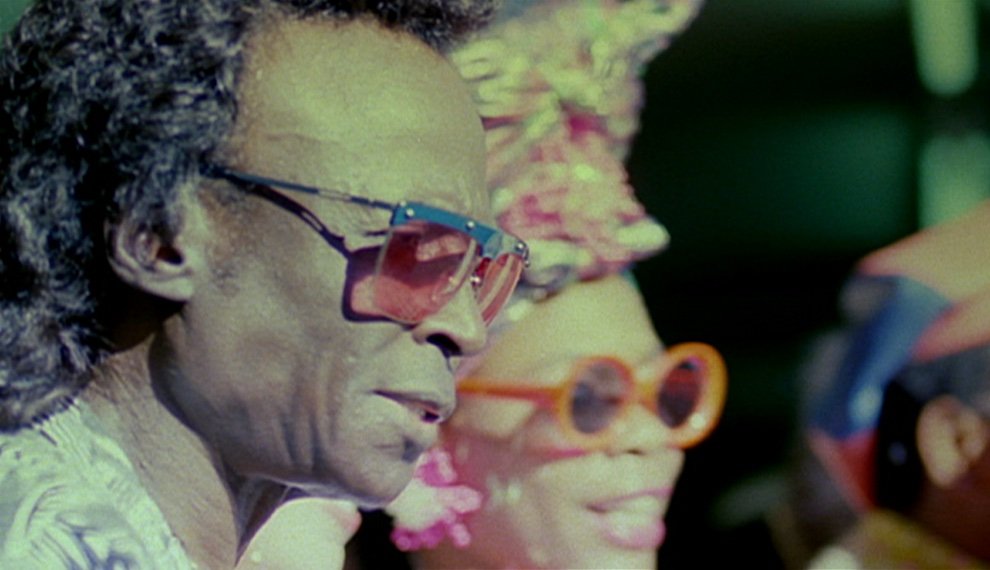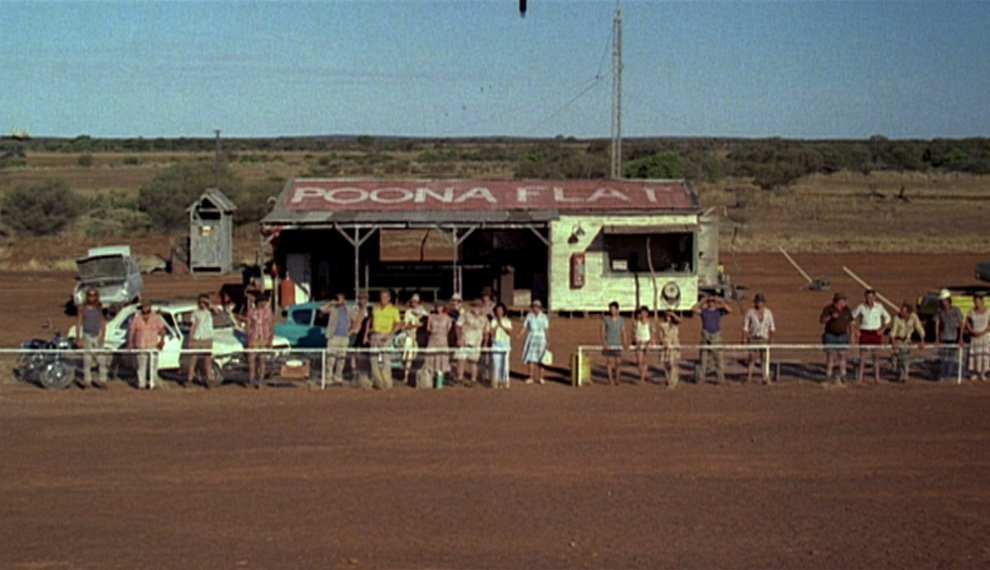After over thirty years of languishing in relative obscurity, Australian director Rolf de Heer’s Dingo from 1991 is getting a rerelease into American arthouses. I honestly may not have noticed but for the presence of legendary jazz trumpeter Miles Davis in a rare acting role. Being that I am a huge Davis fan and I had never heard of the film before, it instantly shot to the top of my must-see list.
Colin Friels is our lead, handyman, and dingo trapper John “Dingo” Anderson. John is happily married with two kids and leads an unassuming existence in a rural Australian town. However, he has big dreams. As a kid in the late ‘60s, his tiny town was treated to an unexpected impromptu concert by world-famous musician Billy Cross (the world-famous Davis). The magical moment sparked an interest in music in the young boy. Now, after decades of playing trumpet and idolizing Cross, he holds onto hope that their paths will someday cross again. Complications arise when John’s old friend and romantic rival Peter (Joe Petruzzi), now a successful businessman in Perth, shows back up after many years. John is initially pleased to see Peter, but old jealousies soon rear their head.
Notable supporting roles also belong to Helen Buday as John’s supportive wife Jane, Bernard Fresson as Cross’ manager, Brigitte Catillon as a sassy secretary that makes a fateful decision, and noted French New Wave actress Bernadette Lafont as Cross’ wife Angie.
Performances are all pretty solid. Friels is relatable as an unfulfilled and flawed everyman. The film is very character-centric and he manages to maintain our attention through a somewhat languorous narrative. Importantly, he does a solid job of miming trumpet playing (session player Chuck Findley was responsible for playing all of John’s music). Though his role is certainly pivotal, Davis’ screentime probably doesn’t warrant the second billing that he receives. His work is a little unpolished, but his stylish look and raspy voice make for an engaging presence. While not a natural acting talent, he nevertheless makes for an effectively flashy foil to Friel’s blue-collar turn.
Marc Rosenberg wrote the script. The basic premise works well enough, but I’d say some specific plot points come off as undercooked. There’s a dreamlike aesthetic to the story that stands out, but it sometimes clashes with the decision to stay within the bounds of realism. At times, I thought we were going to veer off into magical realism but the narrative almost always course-corrected back to the mundane. This makes some of the more unlikely moments come off as ridiculous. I enjoyed the paralleling of John’s story with the three-legged dingo that he hunts in the first half of the film and the depiction of John’s inner frustrations. I also applaud the effort to not make John entirely sympathetic. On the other hand, the romantic triangle and the film’s closing moments are the bits that suffer the most from a lack of proper attention.
Denis Lenoir’s lensing is impressive. Whether it’s shots of John’s lonely playing in the Australian outback or the urbane and bustling streets of Paris, the imagery is consistently pleasing. My favorite moments include the low flying 707 and the runway concert at the beginning of the film, and the climactic Parisian jazz club jam session. The dichotomy between the sets and locations in rural Austrailia and those in Paris give the film a ton of visual flair that accentuates John’s journey and breathe life into the script’s themes.
Obviously music plays a huge part here. Davis and Oscar winner Michel Legrand composed the score, with Davis and the aforementioned Findley being prominently featured. Though this is not a musical, there is almost always music accompanying the visuals. The musical performances are not presented live, with performers miming their actions to match the score. This is obvious at times, but it didn’t detract from my enjoyment. Although it doesn’t rise to the level of Davis’ lush and moody work on Louis Malle’s Elevator to the Gallows, it nevertheless makes for a distinctive experience. Fans of Davis’ work should be pleased and neophytes will probably appreciate its unique dynamism.
Rolf de Heer’s Dingo is a bit of a curiosity at this point. I don’t think it completely works, but as a fan of Miles Davis and jazz in general I was still totally enraptured. At 109 minutes the film lags in spots while delivering short shrift to vital plot points. Jazz fans and those intrigued by Australian arthouse and the film’s underseen status will likely find it to be a worthwhile watch, though. Davis passed away right before the film premiered in Australia, so it would prove to be some of his final creative work. I’m sure that alone will warrant a watch for some folks. Purportedly, a digital and disc release are being planned after the theatrical run wraps up. I will definitely be adding the disc to my collection. Recommended, with caveats, for fans of preternaturally smart dingoes, blasting trumpet solos in the wilderness, and following your dreams.
Michael Cavender






